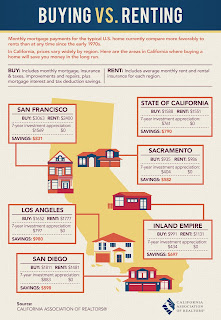 A prospective homebuyer needs to think about total costs and expenses of owning a home--these include the principal and interest on the monthly mortgage payment, home insurance, property taxes, home improvements and repairs. Don't forget--tax deductions on mortgage interest and property taxes are among the savings that you will benefit from, plus other tax deductions as allowed in the owner's particular situation. Renters are basically concerned with costs of monthly rent and renter's insurance.
A prospective homebuyer needs to think about total costs and expenses of owning a home--these include the principal and interest on the monthly mortgage payment, home insurance, property taxes, home improvements and repairs. Don't forget--tax deductions on mortgage interest and property taxes are among the savings that you will benefit from, plus other tax deductions as allowed in the owner's particular situation. Renters are basically concerned with costs of monthly rent and renter's insurance.Is owning for everyone? Perhaps not, depending on the individual's desire to maintain a property, long term financial abilities, and short term or long term job relocation factors, and the fact that in some areas, renting may be a lower monthly expense. But when the long-term view is taken, owning a home offers long-term security and financial return over time. Whether you rent or own, you're paying for the home, but when you rent, you're buying it for your landlord--is that really what you want?
Today's interest rates are still low, around 3.75% for a conventional loan under $417,000 and even lower for FHA loans. In today's buyer's market, we're hearing lots of complaints about buyer competition especially in lower price ranges. While each local market varies, so far this year, housing inventory is up compared to 2011 and 2012, so buyers need to "hang in there" and not give up, because this is still one of the best cycles in which to become a homeowner!
Do you want a more detailed explanation of your rent vs. buy scenario? Please contact me for a buyer's estimate sheet, and for additional market report information, go to my Market Trends page.

